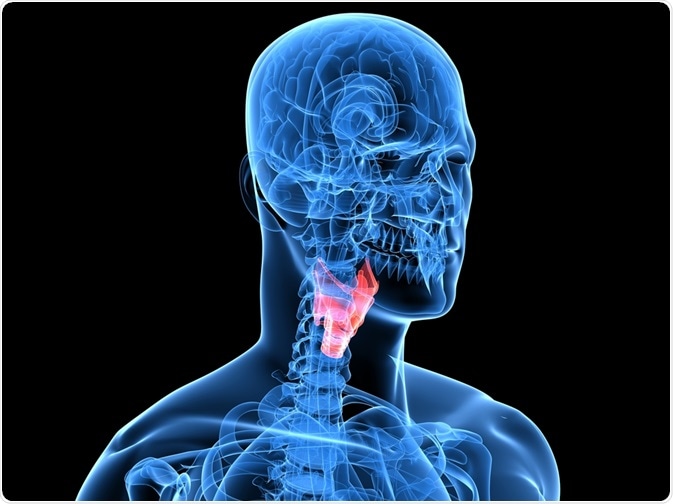The vocal cords guard access to the respiratory tract and are responsible for phonation. Wounds to the vocal cords are thus serious in terms of immediate and long-term consequences and require careful and adequate treatment to preserve life and to maintain function.
 Image Credit: SciePro/Shutterstock.com
Image Credit: SciePro/Shutterstock.com
Causes of vocal cord injury
Penetrating neck injury is responsible for up to 70% of laryngeal injuries and may be due to knifing, or gunshot wounds. The latter may cause vocal cord disruption either by penetration or by the blast wave.
Blunt neck injury is also responsible for any injuries to the vocal cords. Of the blunt neck injuries, 85% of laryngeal injuries are due to motor vehicle accidents. Other causes include compression of the larynx between a foreign object such as a clothesline, steering wheel or dashboard, and the anterior aspect of the cervical spine. Crushing and strangulation injuries can also result in indirect injury to the vocal cords.
Symptoms
Symptoms of trauma to the vocal cords include:
- Hoarseness
- Dyspnea or difficulty in breathing
- Dysphonia or difficulty in speech
- Hemoptysis or bringing up blood in sputum
- Tenderness over the front of the neck
- Subcutaneous emphysema
- Inability to make out the normal structure of the larynx on external palpation and imaging
Diagnosis and treatment
Diagnosis of vocal cord trauma is made on the basis of an adequate history with questions directed at eliciting signs and symptoms of this condition, with imaging techniques such as plain radiographs, CT scanning and endoscopic visualization of the larynx. CT imaging is often helpful in differentiating injuries that need immediate treatment by surgical closure, from those which may be observed, such as minor lacerations of the laryngeal mucosa.
Successful treatment depends upon early diagnosis and managing the airway injury in time. Restoration and maintenance of respiratory airflow in case of obstruction usually requires tracheostomy under local anesthesia.
Intubation and cricothyrotomy are considered hazardous. Direct laryngoscopy is essential to visualize the laryngeal structures and soft tissues, while esophagoscopy will help evaluate the pharynx and esophagus. Associated skeletal laryngeal injuries must be set. Where the vocal cords are massively injured, or there is a disruption of the anterior commissure, endolaryngeal stenting is required.
Pediatric vocal cord injuries are more likely to endanger life because of the smaller space available for airflow in children. Most cases require a tracheotomy.
References
Further Reading
Last Updated: Oct 31, 2022